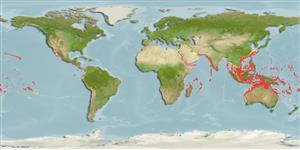Environment: milieu / climate zone / depth range / distribution range
Ecology
Marine; reef-associated; depth range 3 - 150 m (Ref. 9281). Tropical; 30°N - 35°S, 29°E - 70°W
Indo-Pacific: in tropical waters, from South Africa to Hawaii and Easter Island, north to southern Japan and south to Lord Howe Island. Eastern Pacific: Revillagigedo, Clipperton and Cocos islands (Ref. 9281).
Size / Weight / Age
Maturity: Lm ? range ? - ? cm
Max length : 51.0 cm NG male/unsexed; (Ref. 89467); max. published weight: 1.8 kg (Ref. 89467)
Dorsal spines (total): 0; Dorsal soft rays (total): 96 - 104; Anal spines: 0; Anal soft rays: 74 - 81. Eyed side with dark margined light colored spots and numerous scattered small dark spots; normally with 3 dark blotches or spots on lateral line; dorsal and anal fins with longitudinal row of widely-spaced dark spots; pectorals of the eyed side with dark crossbars (Ref. 4417).
Inhabit sandy bottoms of coastal coral reefs (Ref. 5213, 48637), generally in shallow water (Ref. 9281). Benthic (Ref. 58302). Hunt mostly at night, but also active during the day. Often crawling over low rocky reef (Ref. 48637). Occasionally rest on bare rock (Ref. 1602). Feed on fishes, crabs and shrimps. Collected by divers (Ref. 9824).
Life cycle and mating behavior
Maturities | Reproduction | Spawnings | Egg(s) | Fecundities | Larvae
Hensley, D.A., 1986. Bothidae. p. 854-863. In M.M. Smith and P.C. Heemstra (eds.) Smiths' sea fishes. Springer-Verlag, Berlin. (Ref. 4417)
IUCN Red List Status (Ref. 130435)
Threat to humans
Harmless
Human uses
Fisheries: commercial; aquarium: commercial
Tools
Special reports
Download XML
Internet sources
Estimates based on models
Preferred temperature (Ref.
123201): 23.8 - 29, mean 27.7 °C (based on 1590 cells).
Phylogenetic diversity index (Ref.
82804): PD
50 = 0.5000 [Uniqueness, from 0.5 = low to 2.0 = high].
Bayesian length-weight: a=0.01000 (0.00426 - 0.02347), b=3.07 (2.89 - 3.25), in cm total length, based on LWR estimates for this Genus-body shape (Ref.
93245).
Trophic level (Ref.
69278): 4.4 ±0.0 se; based on diet studies.
Resilience (Ref.
120179): Low, minimum population doubling time 4.5 - 14 years (Preliminary K or Fecundity.).
Fishing Vulnerability (Ref.
59153): Low vulnerability (18 of 100).
Nutrients (Ref.
124155): Calcium = 37.4 [14.6, 68.9] mg/100g; Iron = 0.5 [0.2, 0.9] mg/100g; Protein = 18.4 [16.9, 20.0] %; Omega3 = 0.0885 [, ] g/100g; Selenium = 41.6 [20.7, 91.1] μg/100g; VitaminA = 83.6 [21.4, 339.0] μg/100g; Zinc = 0.681 [0.436, 1.016] mg/100g (wet weight);
